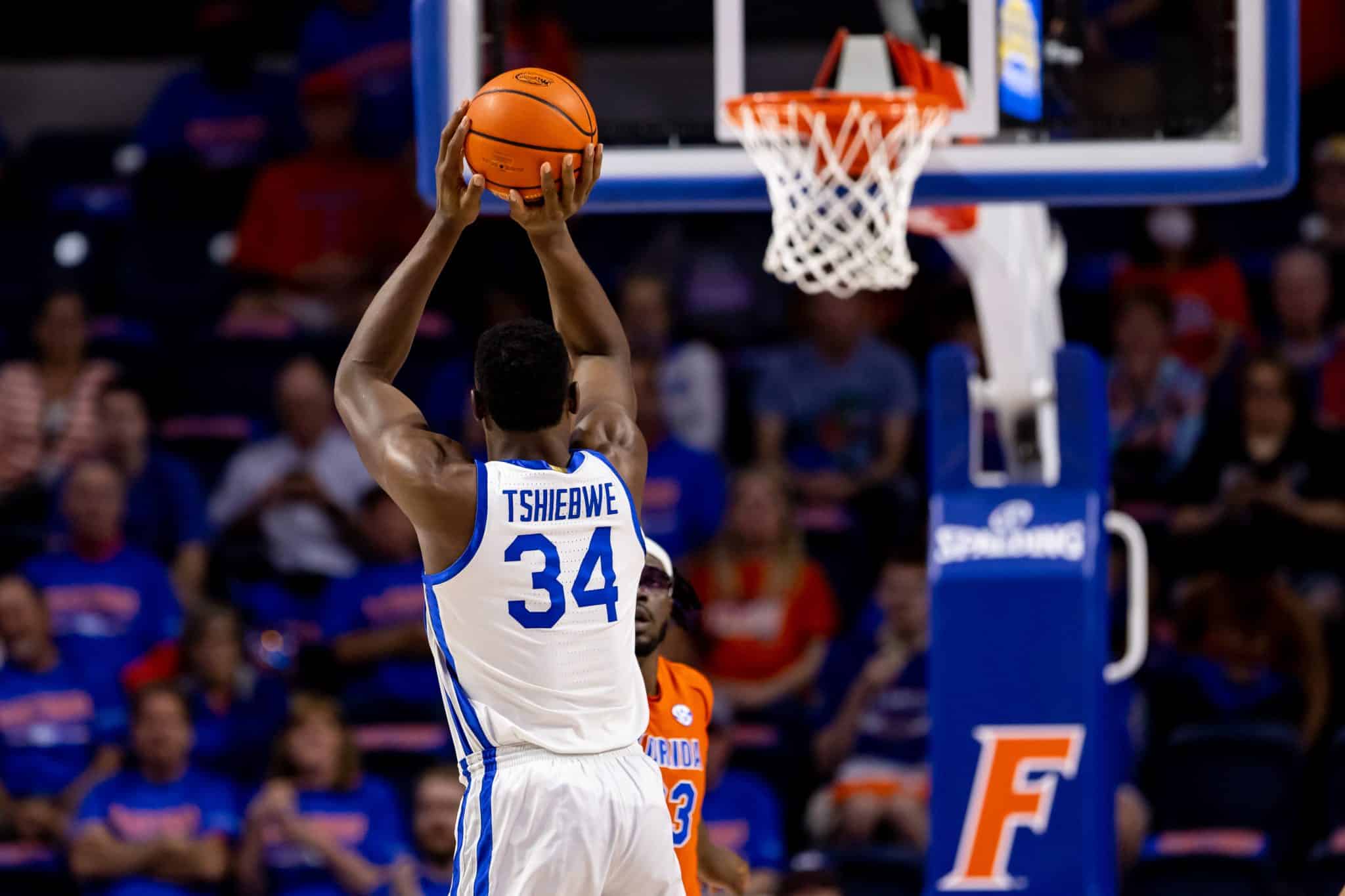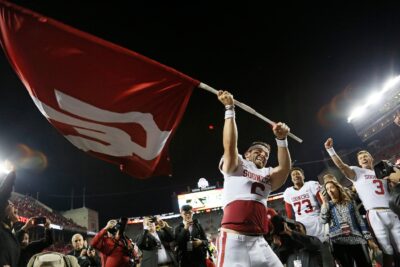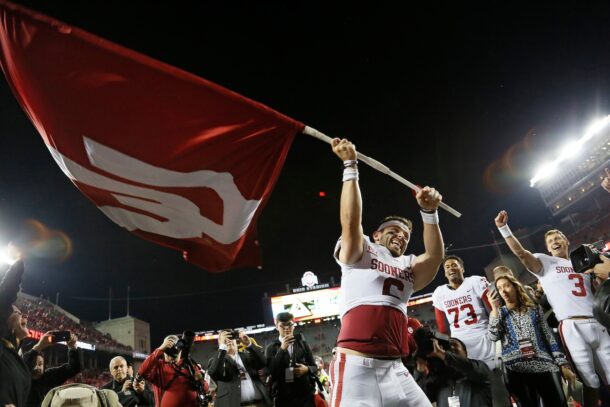
Kentucky basketball: If this is goodbye, Oscar Tshiebwe leaves as a legend who deserved better
By Joe Cox
Published:
His oddyssey (apparently) ended in Greensboro, North Carolina, far from Lexington, far from Morgantown, and farther from Hermitage, Pennsylvania, or the Democratic Republic of the Congo. In 2 seasons of record-breaking college basketball, Oscar Tshiebwe ended up never reaching the Sweet 16, much less the Final Four. Of all the numbers associated with Tshiebwe’s run in Lexington, the one that might be the strangest is 1-2: Kentucky’s NCAA Tournament record with him.
In the locker room in Greensboro, Tshiebwe literally could not bring himself to face reporters after Kentucky’s season-ending loss Sunday, fielding questions literally over his shoulder while staring dolefully into his locker, a second consecutive season of Kentucky team underachievement over. One thing is clear — he deserved better.
Tshiebwe came to America from the Congo in 2015, only about a year and a half after he began playing basketball. From a private high school in Grundy, Virginia (875), Oscar ended up at a Catholic school in Hermitage, Pennsylvania. He starred there, and earned a scholarship from Bob Huggins and West Virginia. After a promising freshman season when he averaged 11.2 points and 9.3 boards per game, his sophomore season was a disaster. Tshiebwe played in only 10 games and left WVU due to personal issues. He and Huggins never saw eye-to-eye.
Kentucky and John Calipari took a flier on him. The book on Tshiebwe was that he was talented but offensively challenged. A solid contributing player, but at the end of the day, was he better than whatever 5-star freshman Calipari would sign?
Well, yes, he was.
In his first game in Lexington, he had 17 points and 20 rebounds (Kentucky lost to Duke). A month later, he had a 28-rebound game. Since Kentucky began tracking rebounds in 1951, only 4 Wildcats had grabbed more than 28 rebounds in a game. And the last such occasion was in 1969. When Adolph Rupp was the coach. And the Kentucky program had not yet racially integrated.
Indeed, Tshiebwe was something else. Somewhere between Kenneth Faried, Dennis Rodman, and a tracking device, he was almost spiritually gifted in reading the flight of a missed shot. Yes, he had limitations — in shooting range and foot speed, most notably. But what he did well — play old-fashioned, bang and bump post basketball — hadn’t been seen even at Kentucky in many, many years.
Only twice last season did he not grab double-digit rebounds. Meanwhile, a combination of put-backs, post moves, and the occasional mid-range jump shot turned Tshiebwe into an offensive threat. He scored 25 or more 7 times, including 3 30-point efforts. But for what he did on the floor, he also captivated Kentucky off the floor.
An intensely religious man, Tshiebwe used his newfound celebrity to speak to youth groups and various church audiences. When he finally figured out his way around the red tape of NIL legislation and his immigration status, Tshiebwe ended up buying his mother a house and then started a charitable foundation to provide food, clothing, school supplies and educational initiatives in the Congo.
The only thing bigger than his rebounding game was his smile. In an era of one-and-done immediacy and self-interest, Tshiebwe felt like the real thing — a gentle giant who would use Kentucky’s fishbowl to great effect. The fact that he ended up being the National Player of the Year certainly didn’t hurt.
But his earnest goodness made the fall that much worse. Kentucky’s season-ending loss to No. 15 seed Saint Peter’s wasn’t Oscar’s fault — he had 30 points and 16 rebounds. But Kentucky — a year after a 9-16 season — had again become a punch-line. And Tshiebwe, with a comfortable NIL landing in Lexington and a questionable NBA future, decided to stick around.
Year 2 lacked some of the feel good moments of Year 1. He often seemed exasperated with his teammates and opened the season dealing with injury issues. But while he was questionable for Kentucky’s early game with Michigan State, he played … and ended up with 22 points and 18 rebounds. In a January game with Georgia, he gave what might have been his best single-game performance with 37 points and 24 rebounds. Tshiebwe wasn’t the National Player of the Year again, settling instead for a 2nd-team All-American selection. He was Kentucky’s first 2-time All-American since Tayshaun Prince in 2001 and 2002.
And again, Kentucky fell flat in March. Can’t blame Tshiebwe (again, 25 points and 18 rebounds), but a bad shooting night against Kansas State ended UK’s season in the round of 32. While Tshiebwe could get another year of eligibility due to the COVID rules, it seems more likely this time that his UK days are over. And if so, what days they have been.
Tshiebwe grabbed 952 rebounds in 2 UK seasons — which ranks 6th in program history. The most recently active player ahead of him is Dan Issel, who finished his UK career 53 years ago. He scored 1,117 points in Lexington, which is 48th all-time on UK’s list. But more than the numbers, more than the honors, in an era when fans struggled to build familiarity and relationship with players who were often part of UK’s program for about 6 months, Tshiebwe was a true throwback.
While the last few difficult seasons have repeatedly highlighted the challenges for current Kentucky Wildcats in bonding with Big Blue Nation, Tshiebwe didn’t seem to ever need much help. At the end of the day, Kentucky fans — temperamental and cranky as they can be — expect excellence. Even better if it’s delivered with a little personality, a little humility. Many from Pikeville to Paducah wouldn’t be too sorry to see John Calipari move along. But almost all of them will miss Oscar.
How many decades will it be until somebody rebounds the ball like Tshiebwe? And when he does, will he do it with a smile? Will he talk to children about God and send money home to help poor children? The wait for another Oscar might well be forever. And that’s a bigger shame than an early NCAA Tournament exit.
Thanks again, Oscar. You deserved better in March.
Joe Cox is a columnist for Saturday Down South. He has also written or assisted in writing five books, and his most recent, Almost Perfect (a study of baseball pitchers’ near-miss attempts at perfect games), is available on Amazon or at many local bookstores.







